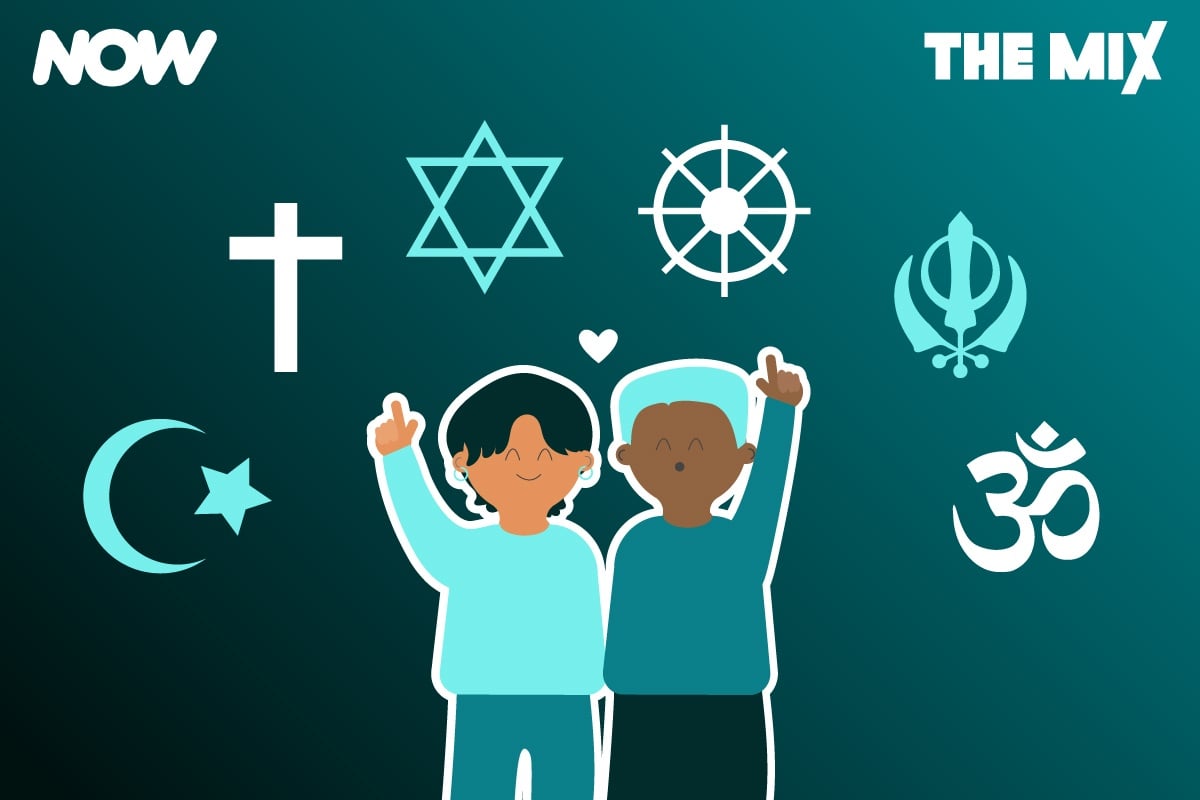How does religion affect relationships?
Nowadays having the same religion and culture isn't the priority when searching for a potential partner. But that doesn’t mean they’re completely insignificant. So, how does religion affect relationships? The Mix looks at the different challenges that might arise in mixed relationships and how to overcome them.

Can you be together if you’re from different religions?
Whatever background you come from, there’ll always be some differences between you and your partner. Whether that’s over something as small as your favourite cereal or as big as coming from a different religious community. The issue only comes in when you can’t find a compromise between your viewpoints. That’s why ‘how does religion affect relationships?’ is a pretty subjective question. To some extent, the answer will depend on how much your beliefs shape your life and how strongly you want your partner’s beliefs to align with your own.
By no means are we saying that you always have to agree with your partner. In fact, it can make life interesting to be close to someone who disagrees with you. Just as long as those disagreements don’t become fundamental problems in your relationship.
Telling your friends
Thanks to entrenched stereotypes in our society, you can’t be sure that all of your friends will be supportive if you have chosen to be in a relationship with someone from a different religious community. Be prepared to explain to them how you feel about your partner. Let them meet each other and form their own opinions based on the person rather than the religion. And if they still have a bad reaction, then you need to ask yourself whether these ‘friends’ are really the type of people you want to be hanging out with?
“Often people go through a process of discomfort before they see each person as a human being, rather than from the culture that they are from,” explains Emily Sommerman, a clinical psychologist.
Her advice is to work through a number of potential scenarios: “Before you introduce your new partner, figure out what your reaction to other people’s comments would be, and then decide how you want to talk to people about it.”
If family members don’t approve of your relationship
Both your family and your partners’ family may have problems accepting your relationship if you are both from different religious or cultural communities. If you’re going to be meeting the parents for the first time we’ve got some tips for that here.
In some circumstances, your partner may choose to keep your existence a secret from their parents. We know that it doesn’t feel nice to be kept a secret, but you have to try to be understanding. Some parents may have challenging or outdated views about religion, race and ethnicity in general, as well as interfaith relationships.
Keeping relationships a secret
21-year-old Ali, a Muslim, had a three-year relationship with a Catholic girl. He chose to keep the relationship a secret from his family. “Girlfriends aren’t allowed in Islam, especially not white partners”, he explains. “My family would be ashamed and my dad would’ve probably disowned me. Keeping the relationship secret was an emotional drain and made my girlfriend feel uncomfortable, but I didn’t really have a choice.”
According to relationship advisor Matt Whyman, this kind of problem isn’t uncommon. “The main problem people face when getting into an interfaith relationship is negative reactions from family and friends,” he says.
So what’s the solution? “The most important responses are respect and understanding – for your family and your partner. Be ready to sit down and discuss issues; listen as well as talk. You need to address problems without putting pressure on them to understand. Often they’ll come around eventually, it may just take a beat.”
Read our article about coming out to a religious family.
Dealing with cultural differences between a couple
So, how does religion affect relationships? Well, you may have to adapt to certain customs, such as celebrating their religious traditions. Keep an open mind and remember that it doesn’t hurt to compromise. “Soon after we started dating, I felt my girlfriend was insensitive to my culture and I disliked that,” says Ali.
Make an effort to learn about your partners’ religion so you understand their perspective. Some things may seem overwhelming at first, but if you stay together long term, they’ll become second nature. If you’re unwilling to make even small changes, it’s unlikely that the relationship will work in the long run.
“Any relationship is going to have a lot of differences – especially when there are two different cultures involved. My main advice would be that compromise is key. Between the couple as well as their families.” says Emily. “Don’t forget controversy and difficulties can bring you closer together.”
Making a relationship work long term
When it comes to bigger issues such as moving in together, marrying and having children, it’s important for couples from different religious and cultural backgrounds to have these conversations early on. That way you can figure out how much each person is willing to give and take, without the pressure of those major events. If either of you have strong feelings that your children should be brought up in a certain way, for example, it’s best to iron those differences out earlier rather than when it’s four months until the baby’s due.
Religion can affect a relationship in loads of different ways, but Ali thinks there is a lot to be gained from interfaith relationships. “Being with someone of a different religion opens your mind up to different world views and teaches you how to compromise,” he says.
Have you dated someone from a different culture or religion? We’d love to hear from you, why not share your experience on our discussion boards?
Next Steps
- Muslim Youth Helpline provides free and confidential faith and culturally sensitive support services targeted at vulnerable young people under 25 in the UK. Contact them on 0808 808 2008. Opening times: Mon to Fri: 6pm -12am sat - sun: 12pm-12am
- Chat about this subject on our Discussion Boards.
By Katy Muench
Updated on 29-Dec-2021
No featured article














